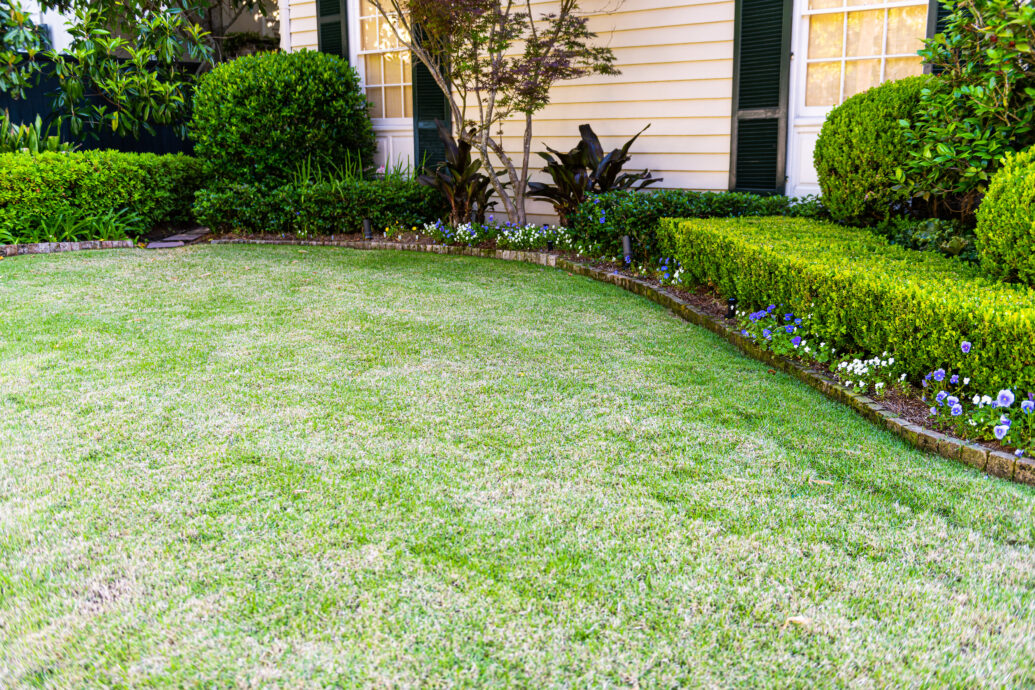A garden that includes native plants and rainwater management strategies can be beautiful, low maintenance, and good for the environment.
When it rains in Louisiana, it not only pours, it often floods—and sunny summer days often send the heat index soaring past 100 degrees. Add the seasonal threat of hurricanes that comes with living in a subtropical, coastal environment, and you have a list of challenges that could intimidate any gardener. The good news? A garden that includes native plants and rainwater management strategies can be beautiful, low maintenance, and good for the environment. Here are a few guidelines to consider when creating a Louisiana-friendly lawn.
Opt for Native Plants
Native plants evolved alongside Louisiana’s native animals, birds and insects over thousands of years. Not only do native plants foster biodiversity and support native pollinators, such as the Gulf fritillary (our state butterfly), they’re also hardy and thrive in our wet, humid environment. Four inches of rain in an afternoon could drown a delicate African violet, but a bevy of Louisiana irises positively thrive in the downpour (and don’t mind the resulting standing water, either). While some gardeners complain that Louisiana plants have shaggy or weedy appearances that deviate from the Eurocentric garden standards displayed by formal rose gardens, for example, others find that swampy, wild quality appealing in its own right. Plus, you don’t have to exclude non-native plants from your garden. Just weave a few locals in, too.
Some native plants include:
- Louisiana Phlox.
- Louisiana Iris.
- Luna Hibiscus.
- Virginia Willow (Itea virginica Henry’s Garnet).
Include Rainwater Management Strategies
No matter where you live in southern Louisiana, water is going to be an issue at some point, and if you live in New Orleans, a below-sea-level city that depends on a massive pumping system to keep it from filling up like a bowl during downpours, flooding is a day-to-day threat. That’s why every homeowner should consider rainwater abatement strategies that retain water on their properties and slowly release it over days into the municipal drainage system, preventing the rainwater from overwhelming streets and properties.
Options can include:
- Rain barrels
- French drains
- Replacing concrete patios and driveways with permeable pavers
- Applying for Louisiana Certified Habitat Program
The simplest of these is a rain barrel that connects directly to a house’s storm drains. Empty it before a rain, then let it collect rainwater that can later be used for watering plants. Next up is a rain garden–a depression in the ground that water is directed to, planted with water-loving native plants like the wax myrtles, dwarf palmettos and Louisiana iris.
More ambitious are French drains (named for their inventor, Henry French), which are trenches filled burrito-style with gravel surrounding a pipe that redirects water. It can be directed away from a home’s foundations, for example, and into a rain garden.
Consider removing concrete patios and driveways and replacing them with permeable pavers, which top a deep gravel sub-base. Together, they create a place for water to be retained during a downpour. Some permeable paver-clad yards can hold 65,000 gallons of water per rain event.
Where to start? Consider applying for the Louisiana Certified Habitat Program —it’s a fun, easy way to raise awareness of the importance of native plants and meet like-minded gardeners. Green Light New Orleans provides and installs rain barrels free to residents. The organization reminds residents:
It’s time for each of us to educate our community about rainwater management and to set a positive example for others to follow! You can be a part of the stormwater solution!
The LSU AgCenter also offers a plethora of resources for people who want to support Louisiana with their yards—and though the end result might not be an expanse of pesticide-maintained Bermuda grass surrounded by pavement, it will be a lot more unique, and uniquely suited to maintaining the beautiful state we call home.
